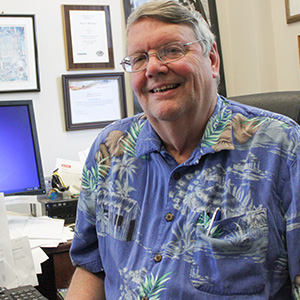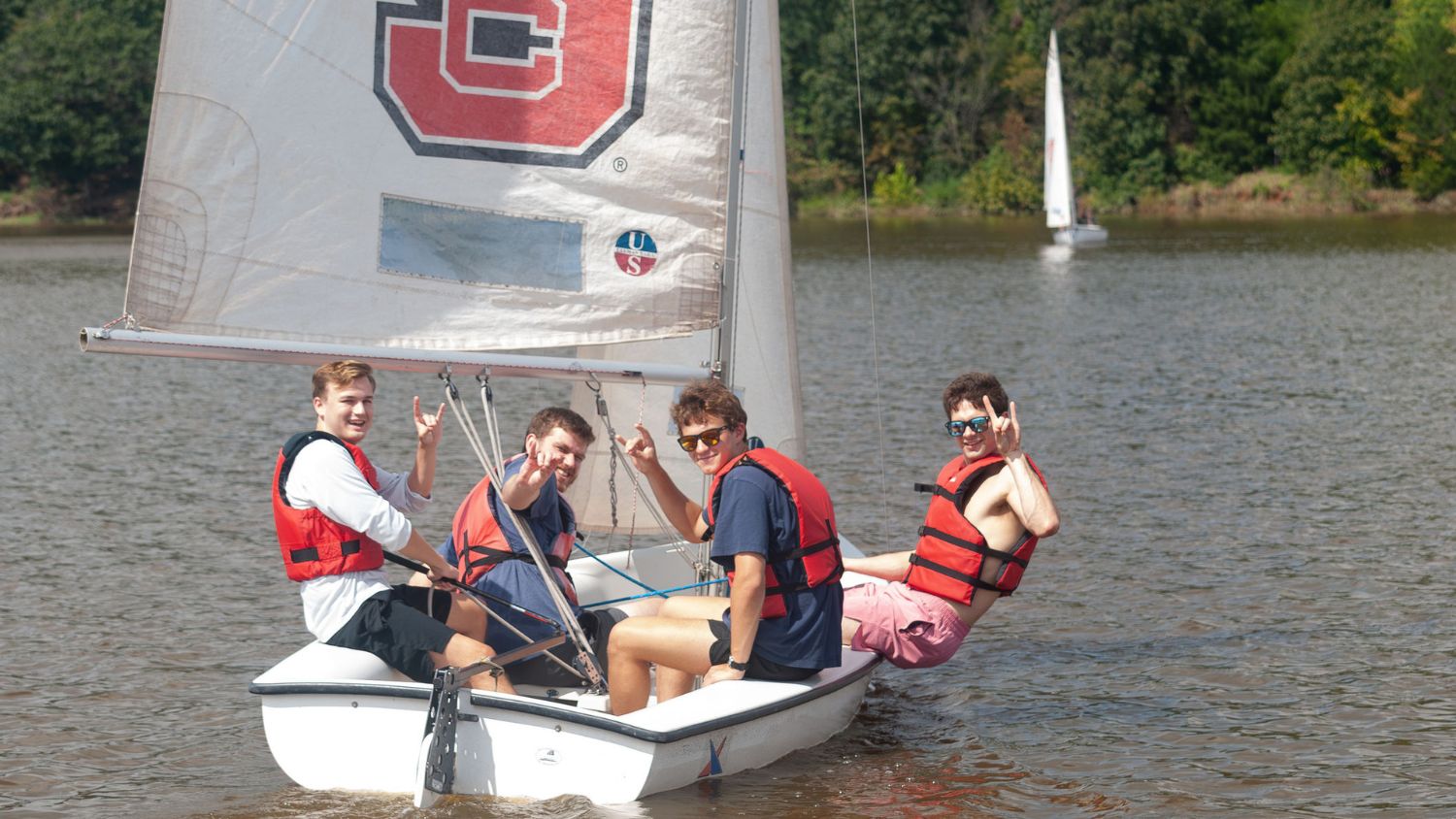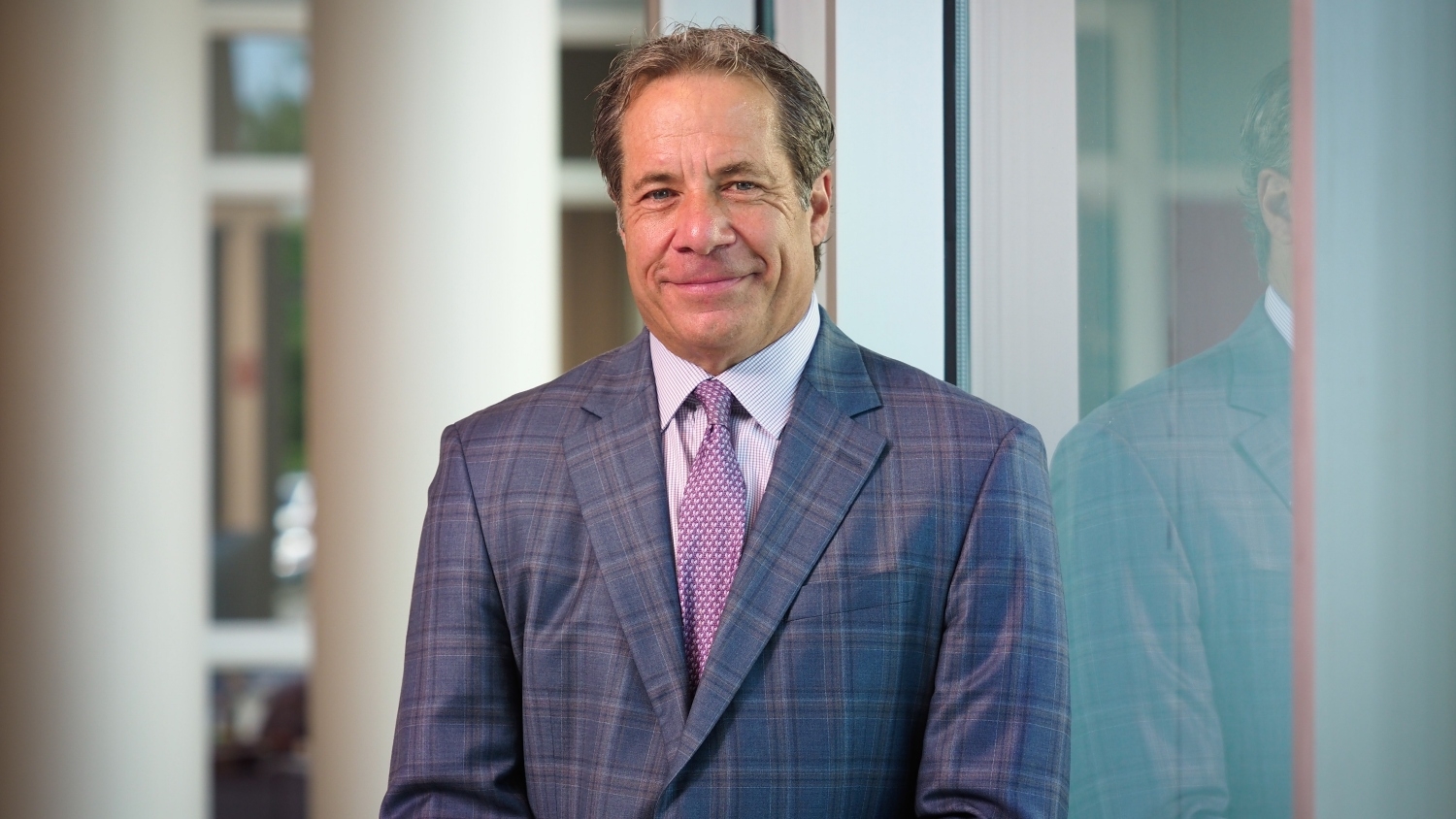Two Poole College professors receive NC State’s Holladay Medal for Excellence
Two of the five 2016 Alexander Quarles Holladay Medal for Excellence honors awarded May 3 by NC State University went to Poole College faculty members Steve Allen, professor of economics and management, innovation and entrepreneurship, and associate dean for graduate programs and research, and Paul Williams, professor of accounting.
The Holladay Medal is the highest award made by the university in recognition of a faculty member’s achievements and contributions to the university. It has been awarded by NC State since 1992 to recognize members of the faculty who, over the course of their careers at NC State, have made outstanding contributions to the university through their service and achievements in research, teaching or extension and engagement. It was established in 1992 in recognition of the career-long contributions to the university made by Alexander Q. Holladay, the university’s first professor of history and its first president.
Also honored this year were Robert Anholt, William Neal Reynolds Professor, Department of Biological Sciences; Donald Brenner, associate department head and Kobe Distinguished Professor, Department of Materials Science & Engineering; and Rupert Nacoste, professor of psychology, Department of Psychology.
Previous Poole College recipients are Jack Wilson (2003), professor of economics; Robert Clark (2006), professor of economics and management, innovation and entrepreneurshp; and Art Padilla (2006), professor of management, innovation and entrepreneurship.
Allen and Williams have a long history at NC State that includes the formation of what is now the Poole College of Management. They had both joined the NC State faculty when accounting, economics and management were taught as part of what was then the School of Humanities and Social Sciences.
Documents supporting Allen’s and Williams’ nominations for the award shine a light on the extensive role of a university faculty member. It includes service related to the governance and operations of the university, ongoing significant research and service to their discipline and related professions, as well as transferring knowledge to students through teaching and mentorship.
“Both Paul and Steve have played an integral part in the growth and recognition of the Poole College of Management. They are most deserving of this honor and we at Poole are proud of their accomplishments and honored to have them as colleagues,” said Ira Weiss, dean and Stephen P. Zelnak Jr. Chair.
Read about our 2016 Alexander Quarles Holladay Medal for Excellence Honorees
Steve Allen | Paul Williams
STEVE ALLEN | Departments of Economics and Management, Innovation and Entrepreneurship

Steve Allen joined the NC State faculty in 1978 as assistant professor in economics after receiving his Ph.D. in Economics from Harvard. One of the top labor economists of his generation, he is known for his work on absenteeism, collective bargaining and employee benefits. Allen’s research has been supported by the National Science Foundation, Sloan Foundation, U.S. Department of Labor and Interamerican Development Bank.
He was the first economist from NC State to be appointed as a research associate for the National Bureau of Economic Research, a nonprofit research institute based in Cambridge, Massachusetts. Service on the NBER is one of the top honors in the field of economics. His published research placed him No. 10 in terms of pages published in the top five journals and No. 13 among the top 100-150 journals, according to an Economic Inquiry study published in 1996.
Allen’s expertise led to an invitations from President Bill Clinton to lead a session at an economic conference held at Emory University in 1995 and attended by both President Clinton and Vice-President Al Gore. He also received two Fulbright Awards to teach and do research in Uruguay, South America, and has been an invited presenter at leading universities in the U.S.
At NC State, Allen has had a leadership role in developing graduate management education. Under his direction, the college’s flagship master of science in management program, which had 175 students, was transformed into an MBA with a rising reputation and a current enrollment of more than 500 students. Most recently, the part-time program was ranked 34th best by US News. Other NC State Jenkins rankings in the past year: 15th best online MBA by US News, the 29th best full-time MBA by Bloomberg Businessweek (up from 54 two years ago) and the 45th best part-time MBA program by Bloomberg Businessweek.
Enrollment has more than doubled as the MBA program expanded in 2006 with an instructional center located in Research Triangle Park and again in 2011, with the launch of an online platform.
In his role as associate dean, he advocates for setting priorities and putting processes in place that enable the launch of new programs through bridge-building across campus. This has expanded the college’s portfolio of graduate programs, which now includes dual and joint degree programs with colleges across campus plus two international dual degree masters programs – one with Aix Marseilles University and one with Skema Business School. Allen also is leading work on a proposal to establish a Ph.D. program in Management.
He also has advocated for team-teaching of courses, such as the Product Innovation Management course which has been cited by Forbes as one of the 10 most innovative MBA courses, and helped drive graduate student participation in international studies, aligned with Dean Ira Weiss’s focus on expanding global exposure opportunities for all Poole College students.
In his role as associate dean for research, Allen added a director of research development to the college’s staff; the college’s annual funded research activity has more than doubled as a result.
Allen has taught a wide range of courses at NC State, with consistently high evaluations from students. On the business side, he has taught undergraduate and graduate courses in human resource management and industrial relations. In economics, he has taught senior and doctoral courses on the principles of microeconomics, intermediate macroeconomic theory, labor economics, and the economics of trade unions. He also teaches Global Economics for Managers in the MBA curriculum.
He also has been a subject matter expert on economics for national and local news reporters. His research focuses on four major areas: absenteeism, collective bargaining, employee benefits, and wage flexibility. His work on absenteeism flows from his doctoral dissertation, the first economic analysis of the subject in which he showed incentives on both the worker and firm side play essential roles. His pioneering work in this area became the precursor to a large academic literature in economics on work attendance and was one of the first important contributions in the then-emerging field of personnel economics. His research was supported by a doctoral dissertation grant from the U.S. Department of Labor.
Allen is probably best known for his work on collective bargaining, much of which focused on the building trades. His research, supported by grants by the U.S. Department of Labor and National Science Foundation, found that productivity on union jobs was substantially higher than in nonunion projects, and the percentage difference in productivity was roughly the same as the difference in compensation. Because of superior training and ready access to qualified workers through hiring halls, unionized contractors have been able to compete successfully for private sector projects. In further work, Steve looked more carefully at costs and found that on large union projects there were sufficient economies of scale that made union labor cheaper than nonunion. The research generated news reports in major national media.
He also worked on joint research projects with Clark, regarding employee benefits and retirement. Together, they have written 11 refereed journal articles over the years, a substantial total in the field of economics. One of those studies looked at why workers in jobs covered by defined benefit plans were much less likely to leave their employer than workers in jobs without such plans. A key reason, they found is that much of the compensation in those jobs was backloaded, creating a strong incentive to stay. In another study, looking at the UNC system’s phased retirement program, they found that professors who had received the highest merit raises in recent years were least likely to enter phased retirement.
PAUL WILLIAMS | Department of Accounting

For nearly three decades, Paul Williams has remained motivated by his strong belief in the mission of the federal land grant university system – to make higher education available for all citizens – and to a sense of service that eschews what he calls artificial distinctions between teaching, research and service. Instead, he sees education as a transcendent function of all faculty, including education of themselves, their students and their colleagues. He writes in a document for the Holladay Medal that “a faculty member’s contributions are not confined to a single space but are marbled throughout the university and the wider community.”
Williams cites a brief paper of his that was published in a scholarly journal. It counted for his research and scholarship portfolio, but had a life that extended beyond the journal because faculty members at other schools used his short essay in their classes to get students to think more critically about the responsibilities of the accounting profession.
Students attending the university’s commencement ceremonies also will hear something that was influenced by Williams’ thinking. Wording used by the chancellor when bestowing baccalaureate degrees incudes the phrase, “… with all the rights, privileges and responsibilities pertaining thereto.” A few years ago, that phrase read, “…with all of the rights, privileges and honors pertaining thereto.”
This change in language, that Williams includes among the ‘invisible things that faculty do that make a difference,’ is a small example of the numerous service activities – small and large – that he has engaged in since joining the NC State faculty as associate professor of accounting in 1977. He became a full professor of accounting in 1988, the first full professor of accounting who did not have a primarily administrative role.
Williams’ contribution to teaching over the past 36 years is notable for its variety and rarity. In addition to teaching traditional accounting courses, such as principles, intermediate, cost, and governmental, Williams has developed and taught courses in areas few are qualified to teach, including accounting theory and integration of accounting practice. He has been recognized for his teaching with the Ernst and Young Faculty Excellence Award in 1999 and Poole College’s Outstanding Teacher Award/Academy of Outstanding Teachers in 2004.
He also has been and continues to be instrumental in reviewing applicants for NC State’s leading scholars and honors programs. He brings his personal experience strong belief in the benefits of student athletic programs to his role in monitoring and managing student athletes. He served two terms as a member of the NC State University Council on Athletics, was two-time chair of their Finance, Facilities, and Personnel sub-committee, chaired their Faculty Academic committee, was a member of the Academic Success subcommittee, and served on two NC State Academic Support Program for Student Athletes search committees.
Williams also is recognized as a premiere accounting and ethics researcher. He is the sole author of 23 of his 47 academic publications; 10 of those were published in the past five years. In the past five years, he also has been an invited panelist in the U.S. and internationally nine times and a keynote speaker twice, and has won numerous research awards.
Williams’ service has included roles as editor or associate editor for two journals and as a member of 12 editorial boards, as well as on numerous committees of the American Accounting Association.
A colleague writing in support of his nomination for the Holladay Medal states, “This is a senior professor who sits at the apex of the interdisciplinary and critical accounting scholarly community internationally. In addition, his service to the American Accounting Association has been prodigious. He has held multiple roles in that body for over 25 years and has made a major longstanding contribution to that peak association in the U.S.A. … What marks him out as a senior professor are his qualities not only as an academic and scholar, but as an ethical, people-oriented human being.”
At NC State, Williams has served three terms as the college’s representative to the NC State Faculty Senate where he contributed to a wide range of committees, including planning and development, equity, the Dean’s Review process, academic and personnel policy, and resources and environment. He currently is serving his fourth term on the UNC Faculty Assembly, representing NC State. He also has served on the University Fee Review committee (2007-14), Budget Advisory committee, Library committees (2012-14), Class Evaluation Implementation teams, and Commencement committees (2009-12).
Williams also was involved in the formation of Poole College, serving as a member of the Jones Committee (1989-90), which led to the creation of the College of Management. He also has served or currently serves on departmental committees for strategic planning, faculty recruiting, administrative search, curriculum, workshops, grants, and awards. He contributed significantly over the years to developing Retention, Promotion, and Tenure policies at the department and university levels, served on AACSB and SACs accreditation committees, and Dean Review and search committees.
- Categories:


